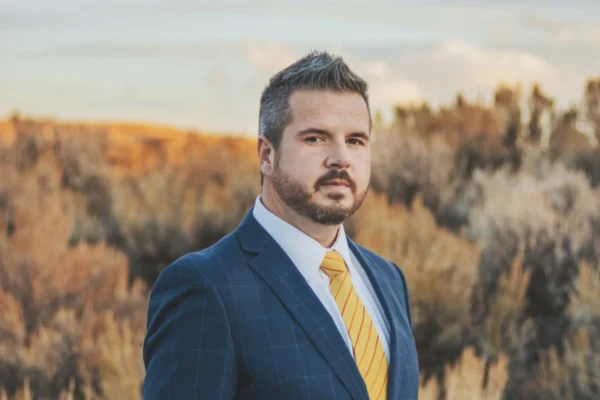Logan Monson entered the race to represent Utah’s House District 69. Logan is running on the Republican ticket.
Logan currently serves as the mayor of Blanding City in San Juan County. He has been in that role for three years, and prior to that time, he served on Blanding’s City Council. He recently narrowly beat Moab’s Lynn Jackson in the Republican Primary and now faces his opponent Davina Smith, who is running as a Democrat.
Logan is employed as a nurse administrator at the Utah Navajo Health System.
Similar to the positions taken by the GOP, Logan has advocated for limited, small government, and conservative values. On local issues, he discussed increasing resources for rural schools and youth mental health.
“We’ve seen some very negative impacts in our community here. Just recently we had three suicides in one week in San Juan County, and that hits people really hard,” he said. He talked about having resources available for helping people cope with the loss of a loved one from suicide. “It just comes down to showing up.”
“We have lots of resources at the state level. The further away you get from the Wasatch Front those resources are still there, but how do we know what they are?” Logan said, referring to those in crisis seeking for help. “Making sure resources are accessible in rural communities is a big deal.”
Logan spoke at length about public land issues. He is a proponent for local control and in favor of the state managing federal land inside the state.
“One issue I’ve seen specifically on these public lands issues is it’s a really big deal at the time,” he said, speaking of new land management decisions. “So Bear Ears came. People down here [were] up in arms about the decision over Bears Ears and fought really really hard to the point where everyone was on board [with] keeping this national monument at the smallest level possible. And now I feel like people are tired… that they have to keep fighting this. That is where state leadership comes in.”
Logan acknowledged the influence of outside parties on public lands issues, which has been a decades-long point of contention in San Juan County. He feels that most people in the district agree with the need for protection on public lands.
“Yes, absolutely, protect the historic sites, the archeology sites,” he continued. “But I also think that as a conservative, we are also talking about protecting the way of life for farmers and ranchers. Grazing, hunting, access to roads. So protection I think is defined differently for conservative groups and maybe for some more left, liberal groups because I think protection at that point means locking everything down.”
While cows may be the most contentious issue on public lands in Garfield and Kane counties, Logan believes that on the San Juan side, cultural issues trump grazing as the most contentious. “Cultural issues seem to be the hot topic for public lands here.” Regarding culture and race, he added, “I think that’s what drives them to pit people against each other.”
“In reality, I think we have a lot more in common [with Native Americans] than what the environmental groups want to allow us to have.”
Outside influence, especially from environmental groups, has been a major problem for the discourse in San Juan County, Logan says. With so much interest in local politics from outsiders, Logan noted that outsiders are often vocal about what they believe San Juan’s issues “should be,” though locals would disagree.
“They always want to plot us against each other,” Logan said. “The best way to divide anybody is to simply tell one party or the other that there is an issue on the opposite side.” For San Juan, the projected issue is commonly about racial differences. “I’ve lived here and grown up here and personally have never had any interaction where I felt like race was in issue. These are just people I live with. It doesn’t matter what color they are.”
“People want us to think that race in general is our problem.” Logan noted that this outside narrative has been around for a long time, but became much more prominent around 2019.
Logan says he is also pro-grazing and his family has been active grazers in San Juan County for generations. He is worried the environmentalists are coming after ranchers and farmers, a threat which he sees potentially as a national security threat.
“I do think [grazing] has a positive impact on the environment in the sense of how things can regrow,” he said. “The lots that are grazed appear healthier.”
– The Byway
Feature image: Logan Monson.
Read more about this interview in The Byway Interviews Candidates for Utah House District 69.

